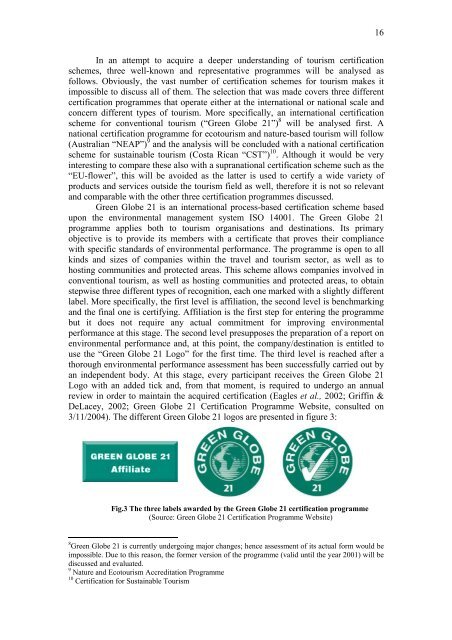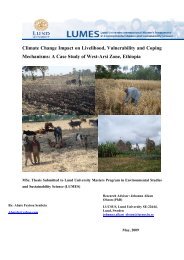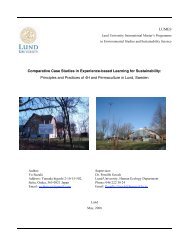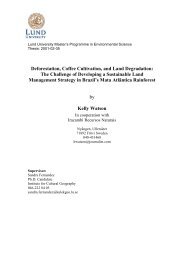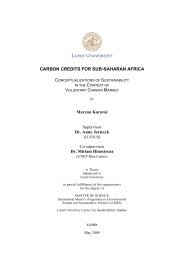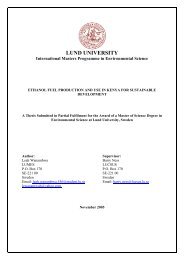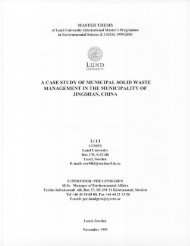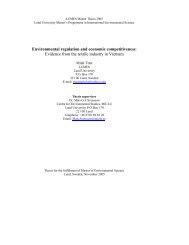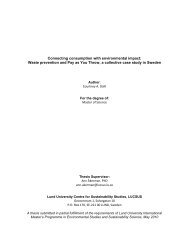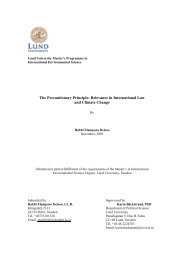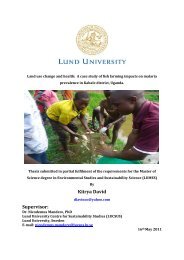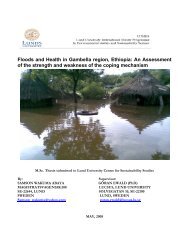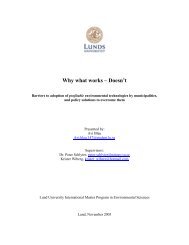Thesis title: âThe development of community-based ecotourism - lumes
Thesis title: âThe development of community-based ecotourism - lumes
Thesis title: âThe development of community-based ecotourism - lumes
You also want an ePaper? Increase the reach of your titles
YUMPU automatically turns print PDFs into web optimized ePapers that Google loves.
16In an attempt to acquire a deeper understanding <strong>of</strong> tourism certificationschemes, three well-known and representative programmes will be analysed asfollows. Obviously, the vast number <strong>of</strong> certification schemes for tourism makes itimpossible to discuss all <strong>of</strong> them. The selection that was made covers three differentcertification programmes that operate either at the international or national scale andconcern different types <strong>of</strong> tourism. More specifically, an international certificationscheme for conventional tourism (“Green Globe 21”) 8 will be analysed first. Anational certification programme for <strong>ecotourism</strong> and nature-<strong>based</strong> tourism will follow(Australian “NEAP”) 9 and the analysis will be concluded with a national certificationscheme for sustainable tourism (Costa Rican “CST”) 10 . Although it would be veryinteresting to compare these also with a supranational certification scheme such as the“EU-flower”, this will be avoided as the latter is used to certify a wide variety <strong>of</strong>products and services outside the tourism field as well, therefore it is not so relevantand comparable with the other three certification programmes discussed.Green Globe 21 is an international process-<strong>based</strong> certification scheme <strong>based</strong>upon the environmental management system ISO 14001. The Green Globe 21programme applies both to tourism organisations and destinations. Its primaryobjective is to provide its members with a certificate that proves their compliancewith specific standards <strong>of</strong> environmental performance. The programme is open to allkinds and sizes <strong>of</strong> companies within the travel and tourism sector, as well as tohosting communities and protected areas. This scheme allows companies involved inconventional tourism, as well as hosting communities and protected areas, to obtainstepwise three different types <strong>of</strong> recognition, each one marked with a slightly differentlabel. More specifically, the first level is affiliation, the second level is benchmarkingand the final one is certifying. Affiliation is the first step for entering the programmebut it does not require any actual commitment for improving environmentalperformance at this stage. The second level presupposes the preparation <strong>of</strong> a report onenvironmental performance and, at this point, the company/destination is en<strong>title</strong>d touse the “Green Globe 21 Logo” for the first time. The third level is reached after athorough environmental performance assessment has been successfully carried out byan independent body. At this stage, every participant receives the Green Globe 21Logo with an added tick and, from that moment, is required to undergo an annualreview in order to maintain the acquired certification (Eagles et al., 2002; Griffin &DeLacey, 2002; Green Globe 21 Certification Programme Website, consulted on3/11/2004). The different Green Globe 21 logos are presented in figure 3:Fig.3 The three labels awarded by the Green Globe 21 certification programme(Source: Green Globe 21 Certification Programme Website)8 Green Globe 21 is currently undergoing major changes; hence assessment <strong>of</strong> its actual form would beimpossible. Due to this reason, the former version <strong>of</strong> the programme (valid until the year 2001) will bediscussed and evaluated.9 Nature and Ecotourism Accreditation Programme10 Certification for Sustainable Tourism


